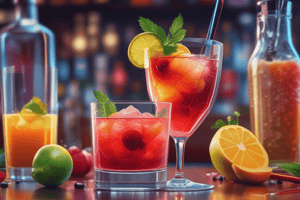Podcast
Questions and Answers
What specialized equipment is used in molecular mixology to achieve unique textures and flavors in cocktails?
What specialized equipment is used in molecular mixology to achieve unique textures and flavors in cocktails?
Which of the following is NOT considered a basic spirit typically found in a well-stocked bar?
Which of the following is NOT considered a basic spirit typically found in a well-stocked bar?
What is the primary purpose of garnishes in cocktails?
What is the primary purpose of garnishes in cocktails?
Which classic cocktail is made with gin, Campari, and sweet vermouth?
Which classic cocktail is made with gin, Campari, and sweet vermouth?
Signup and view all the answers
Which of these classic cocktails is traditionally served shaken, not stirred, with a green olive or lemon twist for garnish?
Which of these classic cocktails is traditionally served shaken, not stirred, with a green olive or lemon twist for garnish?
Signup and view all the answers
Which technique is typically employed for cocktails that require a creamy or frothy texture?
Which technique is typically employed for cocktails that require a creamy or frothy texture?
Signup and view all the answers
In the context of cocktail preparation, what is the purpose of stirring?
In the context of cocktail preparation, what is the purpose of stirring?
Signup and view all the answers
What is the golden rule of cocktails, which simplifies cocktail creation?
What is the golden rule of cocktails, which simplifies cocktail creation?
Signup and view all the answers
What is molecular mixology?
What is molecular mixology?
Signup and view all the answers
Which of the following is NOT a common cocktail garnish?
Which of the following is NOT a common cocktail garnish?
Signup and view all the answers
Study Notes
Cocktails: The Art and Science of Mixology
Mixology, the art of creating cocktails, encompasses a range of techniques, ingredients, garnishes, and classic recipes. From the golden rule of cocktails, which simplifies cocktail creation using a fixed ratio of spirit, sweet, and tart ingredients, to the vast array of mixing techniques and innovative approaches such as molecular mixology, there's a wealth of knowledge to explore in the realm of cocktails.
Mixology Techniques
Basic Mixing Methods
There are two primary methods for blending cocktail ingredients: shaking and stirring. The choice between these two methods depends on the desired texture and temperature of the final product. Generally, shaking is preferred for frothy drinks or those containing bitter elements, while stirring is used for smoother, more elegant cocktails.
Shaking
Shaking is typically employed for drinks with a creamy or frothy consistency, as it incorporates air into the mixture. To shake, pour all ingredients except for ice into a cocktail shaker, fill it with ice cubes, close the lid tightly, and vigorously shake for a few seconds. Strain the mixture into a glass filled with ice to serve.
Stirring
Stirring is a gentle method of combining ingredients, ideal for cocktails where the integrity of individual components needs to remain intact. Fill a mixing glass halfway with ice, pour in the cocktail ingredients, and use a long-handled spoon or barspoon to gently stir until well chilled. Strain the mixture into a chilled glass without ice.
Advanced Mixing Techniques
More complex approaches involve the use of specialized equipment, such as centrifuges, siphons, and vacuum sealers, to achieve unique textures and flavors in cocktails. For example, molecular mixology employs techniques like clarification using a centrifuge or infusion with gases like nitrogen or carbon dioxide through a siphon.
Cocktail Ingredients
A well-stocked bar is essential for creating a variety of cocktails. Some basic spirits include rum, tequila, vodka, whiskey, gin, cognac, and various liqueurs. Sweet ingredients can be simple syrups or more exotic fruit syrups, while tart elements might consist of citrus juices such as lime or lemon. Additionally, bitters and other flavor modifiers are crucial components that add depth to the final product.
Alcohol Substitutions
For those who prefer non-alcoholic versions of classic cocktails, there are options available. Swapping out alcohol for non-alcoholic alternatives or using mocktails made without traditional spirit bases can help cater to all tastes and preferences.
Cocktail Garnishes
Garnishes serve both aesthetic and functional purposes. They enhance visual appeal, release aromas during consumption, and sometimes provide additional flavors. Popular garnishes include citrus peels, cherries, olives, sliced fruits, herbs, and edible flowers.
Classic Cocktails
Classic cocktails have stood the test of time due to their balance of flavors and simplicity. Some iconic examples include:
- Old Fashioned: A timeless drink featuring bourbon or rye, sugar, bitters, and an orange twist.
- Margarita: Made with tequila, triple sec, fresh lime juice, and salt on the rim.
- Negroni: An Italian classic consisting of gin, Campari, sweet vermouth, and a garnish of an orange peel.
- Daiquiri: Simple yet sophisticated, it consists of white rum, fresh lime juice, and simple syrup.
- Martini: This quintessential cocktail combines gin or vodka with dry vermouth and is traditionally served shaken, not stirred, with a green olive or lemon twist for garnish.
Studying That Suits You
Use AI to generate personalized quizzes and flashcards to suit your learning preferences.
Description
Explore the art and science of mixology with this quiz covering basic and advanced mixing methods, cocktail ingredients, alcohol substitutions, garnishes, and classic cocktails. Learn about shaking and stirring techniques, essential spirits, garnish options, and iconic drinks like the Old Fashioned, Margarita, Negroni, Daiquiri, and Martini.




